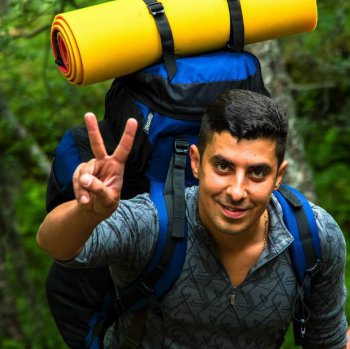Summer trip around Togo and Benin
Summer trip around Togo and Benin
Tour duration: 17 days / 16 nights
Tour dates: 09.08.2018-25.08.2018
Itinerary: Cotonou-Ouidah-Grand Popo-Anejo-Kpalime-Danui Plateau-Kara-Tamberma-Natitingu-Taneka-Dassa-Abomey-Lake Noukoe-Porto Novo
Tour program:
|
Day 1 |
|
Arrival in Benin. Meeting at the airport. Transfer to the hotel. Overnight at the hotel. |
|
Day 2 |
|
The morning will be devoted to getting to know the other members of the group and the guide, settling all related issues such as currency exchange and detailed discussion of the route before starting your journey to explore the country. You can also get a little closer to the city of Cotonou, which is the economic capital of the country. Later in the afternoon, take a walk along the so-called Rue de la Peche (Way of the Fish), a charming coastal road that will take you along the ocean, through numerous fishing villages, where you can see the fishermen at work. Today's destination is Ouidah, a city that has the rather dubious but historically important reputation of being the center of the coast's slave trade. Today it is the center of the voodoo festival, which is held annually in Benin on January 10th. |
|
Day 3 |
|
Today will be dedicated to the culture and history of Ouidah. You will visit the museum and temple of the python, walk 4 kilometers along the path of slaves, listening to the history of these places. Before slavery was banned in almost all countries, about 20,000 people were sold annually in Benin. The Path of Slaves ends at the so-called Gate of No Return, located right by the ocean. This is the place where the descendants of former slaves come to honor the memory of their ancestors, whose fate took a sharp turn and changed their lives forever. Next, you will go to Grand Popo, where you will spend the night. |
|
Day 4 |
|
Grand Popo is located on the beach and is truly a heavenly and peaceful place. You will board a pirogue and go on a short boat trip to the nearby lagoon. On the way back, don't miss the opportunity to visit a private sea turtle sanctuary. At the end of the tour - transfer to Togo, the city of Anejo. |
|
Day 5 |
|
Anejo serves as a so-called base, which provides an opportunity to get acquainted with the life of the region, which is located along the Mono River, which serves as the border between Benin and Togo. The southern part of the country of Togo is known for its rich culture and prevalence of the Voodoo religion, colorful villages and noisy authentic markets selling all kinds of goods, including local pottery, palm oil and sodabi - a local strong drink, vine products. |
|
Day 6 |
|
Continuation of the journey to the northwestern region of Togo: a hilly fertile area rich in coffee, cocoa, fruit plantations, where there are many waterfalls of various sizes. The day will be dedicated to exploring Kpalime and its handicraft markets, while the night will be spent with a hospitable local family. |
|
Day 7 |
|
Today you will go for a walk on Mount Klotho to learn about the natural dyes used by the locals. You will also visit a collective farm for processing and roasting coffee beans. Today's destination is the Danube Plateau. Along the way, a visit to the monastery shop is recommended, where you will be delighted with the selection of jams and essential oils produced by the monks themselves. Overnight camping. |
|
Day 8 |
|
Today will start early and you will continue your journey to the north of Togo. There will be a lunch stop along pui, during which you will be served wagashi sauce, made from cheese made by Fulani women, this cheese is only available in certain northern regions of Togo and Benin. Depending on the speed of movement, additional stops may be made to view the Death Stone or to visit the vine weavers. Overnight in the unofficial capital of Togo - the city of Kara. |
|
Day 9 |
|
After breakfast the adventure will continue and you will head to Tamberma. This part of Togo, bordering Benin, is known for its unusual architecture of residential buildings, which are called "tatas" here. You will be able to explore the area and your guide will be happy to tell you about all the local traditions that have been carefully observed from ancient times to the present day. The shape of the dwellings has not changed for many centuries, since the first huts were built to protect the family from wild animals and warlike neighboring tribes. And although these threats are quite leveled in our time, the locals still keep the tradition of home improvement the way their ancestors did. Until now, there is a custom that a young man can only marry after he has built a tattoo. You will have the opportunity to spend the night in tata visiting a local family. |
|
Day 10 |
|
If at the time of your trip someone is building a tattoo, you should definitely wake up early and visit the construction site. There is a saying here - many hands make any job easy. Volunteers from neighbors and family members help knead and shape the clay, but the owner builds it. Later in the morning you will cross the border into Benin. The day will be dedicated to meeting with representatives of the Somba tribe, who also live in tattoo-like houses, often called castle houses. A guide from the Somba tribe will take you on a tour of the area, talk about the local culture, including the meaning of the drawing on the faces. Continuation to Natitinga later in the afternoon. |
|
Day 11 |
|
Today you will spend the day exploring Natitinga and the surrounding area with a 5 hour walk. You will visit the Fulani cattle breeders, who still lead a semi-nomadic lifestyle and are famous for their rich culture and diverse traditions, which they still hold sacred. The walk ends at the Kotu waterfall, where you can cool off and swim. At the end of the day, a glass of local millet beer and a local snack awaits you: banana dough balls. |
|
Day 12 |
|
Today you will move a little south and arrive at Taneka. This region is not very visited, so the locals have preserved their culture in its original form, which makes today extremely interesting and exclusive. Before going on a tour of the local villages, you will visit the local museum, all the objects of which previously belonged to the villagers. This is an unusual museum - each object here is a pledge that a local resident made for receiving a small amount that he could spend on developing his business. After the deposit is paid, the object can be taken away and thus frees up space for the next local resident who needs a loan. There are no losers in this system: farmers get a quick loan for their own needs, and the museum has a continuous supply of more and more objects to the collection. As soon as you get off the paved road, you seem to find yourself in another world, where time seems to be frozen, and life is calculated in the rhythm of passing days and seasons. You will have the opportunity to meet the King and the Spiritual Leader, the most respected people in Tanek. You will pay a courtesy call to these people who play an important role in the social life of the region, and they, in turn, will give you their blessing to continue on your way. This is a walking tour. Overnight stay in the village as guests of the locals. |
|
Day 13 |
|
After breakfast, it's time to say goodbye to the hospitable locals and head further south. Along the way you will stop at Jonggou to meet local craftsmen who make leather and wicker products. Today's destination is Dassa, a city surrounded by hills. |
|
Day 14 |
|
In the morning you will visit the sacred hills of Dass. And although the city is surrounded by many hills - only 41 of them are considered sacred, since this is the number that is sacred in the Voodoo religion. These same hills previously served as a refuge for those who wanted to avoid the fate of being sold and hiding from the hunters of the slave traders. The remains of ancient structures that were protected by Voodoo rituals can still be seen in the surroundings. Voodoo palaces, which are located in the hills, still serve as an active ritual venue. You can visit one of them and see many voodoo dolls. Then you will go to Abomey, located 90 km. This city was once the capital of the Kingdom of Dahomey. Each king built his own palace, which reached 12 by the time the French invaded. The king who ruled at the time did not want the ancestral homes to fall into the hands of the conquerors, so he ordered them to be burned before retreating. One palace nevertheless survived and now serves as a historical museum, with an impressive collection of exhibits. You can visit this museum later in the day. |
|
Day 15 |
|
After breakfast, you will have a short drive to Bohicon, where a historic discovery was made recently: during roadworks, one of the cars fell into the ground, the hole into which it fell turned out to be nothing more than an underground house. Upon further exploration of the territory, an entire underground village was discovered. It is still not known who inhabited this village, by whom and when it was built. Now it has been turned into a museum. After visiting the museum village, you will travel to Abomey Kalvi, on the coast of Lake Noukue, where you will board a pirogue and go to explore the nearby villages, the most famous and popular among tourists is the village of Ganvie. You will stop for the night at a campsite in one of the villages. |
|
Day 16 |
|
Today your boat trip will continue to places where there are almost no tourists. The locals use their traditional wooden canoes, some of which have colorful sails. This type of transportation is very typical for the locals, as they even go to the market by boat. Late in the morning you will disembark, where a car will already be waiting for you, which will take you to Porto Novo. The day will be devoted to exploring the capital of Benin. You will visit the ethnographic museum, the old town and the botanical garden. |
|
Day 17 |
|
Today begins the last day of your trip to Benin. A handicraft market is held every 5 days in Ajarra. Where local artists sell beautiful jewelry and other handicrafts. If the time of the market coincides with the time of the tour, be sure to visit it before returning to Cotonou. Back in Cotonou, you will have time to shop for souvenirs, walk the city streets and have a farewell dinner before heading to the airport for your flight. Transfer to the airport is provided. |
The cost of the tour subject to double accommodation 1885 euro
Included in the price:
- Accommodation according to the program (guest houses, campsites and hotels)
- All meals as indicated in the program
- Guide service in English or French
- All expenses related to the excursions described in the program
- All transfers indicated in the program
- tourist tax
The price does not include:
- International flight
- Multi-visa to Benin
- Visa to Togo
- Vaccinations
- Personal insurance (travel, health, cancellation)
- Beverages
- Extra food
- Souvenirs
- Personal expenses
- Accommodation or transportation upgrade
- Optional excursions
| Cotonou-Ouidah-Grand Popo-Anejo-Kpalime-Danui Plateau-Kara-Tamberma-Natitingu-Taneka-Dassa-Abomey-Lake Noukoe-Porto Novo | |
| 09-08-2018 | |
| 17 days / 16 nights | |
| from 1885 EUR |





